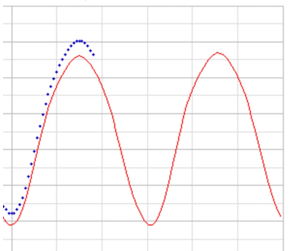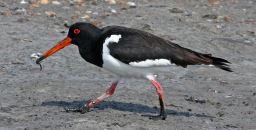Cannon-netting, Dawlish Warren, 4th January 2025
High Tide 3.83m @ 09:26, Sunrise 08:15, Team meet time 06:30, Catch 09:20
The catch was split into three parts, with a recce on the morning of Friday 3rd January, catch set-up on the afternoon of Friday 3rd January, followed by a catch attempt on Saturday 4th January. Sunday 5th January, was selected as a reserve date in the event that the first catch attempt did not go to plan. The recce is a vital part of cannon netting. It is used to observe the number and behaviour of birds present during the tidal period. Based on this information, the best place to set the nets and the appropriate number and mesh size of the nets required to catch the target species can be determined.
| Species | Ringed | Retraps | Controls | Colour ringed | GPS tagged |
|---|---|---|---|---|---|
| Oystercatcher | 1 | 0 | 0 | 1 | 0 |
| Dunlin | 150 | 2 | 2 | 99 | 0 |
Cannon-netting, Dawlish Warren, 3rd November 2024
High Tide 3.84m @ 07:24, Sunrise 07:09, Team meet time 05:20
The Oystercatchers at Dawlish Warren have become increasingly difficult to catch over the past few years. This is principally due to the flock no longer roosting in the recharge area due to a change in beach profile. The flock now roosts almost exclusively on finger point itself, a much more complex site to cannon-net on. Birds can approach a possible net set from all directions; the mix of species and numbers is less predictable, and the site covers on some of our workable high tide series. After recces last winter and another in October, the group leaders formed a plan to catch on finger point in October, which sadly had to be cancelled due to weather, but we were back there in early November for an attempt.
Cannon-netting - Dawlish Warren, 28th October 2022
High Tide 3.99m @ 09:11, Sunrise 07:59, Team meet time 06:00
Firstly, we wish to extend a special thanks to Stephen, and Phil of Teignbridge Council for allowing us to access the site, helping us set kit and for providing waders to team members who needed them. Thanks also go to Devon Wildlife Trust and the Warren Golf Club for allowing our continued access to the site and our project partners NE, UoE and GWCT for their ongoing support.
 Tidal gauge data showing tide making over predictedAfter not being able to make a catch in September, the DCWRG committee were very keen to make a CN catch in October. Although the September attempt was cancelled a big thank you to Lizzie Grayshon (DCWRG CN-licence holder), Ryan Burrell (DCWRG Project Officer) and Tim Frayling (DCWRG Chair) for conducting 3 days of reccees during that high tide series to gain important information for the October catch dates. The main target for October were Oystercatchers to top up our colour-marked sample within the Exe estuary. Each autumn we aim to colour-mark 50 new Oystercatchers in the Exe. The long-term aim of the project being an important survival analysis for Exe oystercatchers, and comparing that to historic estimates, to explore the causes of decline. We started this project in February 2018 and we are generating some fantastic science with our collaborators.
Tidal gauge data showing tide making over predictedAfter not being able to make a catch in September, the DCWRG committee were very keen to make a CN catch in October. Although the September attempt was cancelled a big thank you to Lizzie Grayshon (DCWRG CN-licence holder), Ryan Burrell (DCWRG Project Officer) and Tim Frayling (DCWRG Chair) for conducting 3 days of reccees during that high tide series to gain important information for the October catch dates. The main target for October were Oystercatchers to top up our colour-marked sample within the Exe estuary. Each autumn we aim to colour-mark 50 new Oystercatchers in the Exe. The long-term aim of the project being an important survival analysis for Exe oystercatchers, and comparing that to historic estimates, to explore the causes of decline. We started this project in February 2018 and we are generating some fantastic science with our collaborators.
| Species | Ringed | Retraps | Controls | Colour ringed | GPS tagged |
|---|---|---|---|---|---|
| Grey Plover | 3 | 0 | 0 | 3 | 0 |
Project Background
Over recent years the wintering Oystercatcher population has declined significantly in the UK, but this decline has been even greater on the Exe estuary. A number of factors are suspected to be causing this decline, some relate to the estuary, some at larger scales. The colour-ringing project that we are running should help determine what factors are causing the population decline; and to what extent birds from the SPA use the surrounding landscape. The results will help indicate what, if any, actions can undertaken to help reverse declines.
Oystercatchers are faithful to wintering sites so the birds you have seen here years ago may be the same ones now. The oldest Dawlish Warren Oystercatcher on record is at least 36 years old, last seen in Jan 2018.
If you see a bird with one of our colour rings, please use the form on this website to send us the details (ring-code, date, location, species) or you can send email to This email address is being protected from spambots. You need JavaScript enabled to view it..
Cannon netting totals
2019-2020 winter totals
| Species | Ringed | Retraps | Controls | Colour ringed |
|---|---|---|---|---|
| Oystercatcher | 47 | 3 | 0 | 47 |
2021-2022 winter totals
| Species | Ringed | Retraps | Controls | Colour ringed |
|---|---|---|---|---|
| Oystercatcher | 53 | 5 | 1 | 51 |
| Curlew | 19 | 0 | 2 | 19 |
| Redshank | 33 | 0 | 0 | 0 |
| Dunlin | 31 | 0 | 0 | 31 |
| Grey Plover | 4 | 0 | 0 | 4 |
| Ringed Plover | 3 | 0 | 0 | 0 |
2022-2023 winter totals
| Species | Ringed | Retraps | Controls | Colour ringed |
|---|---|---|---|---|
| Grey Plover | 3 | 0 | 0 | 3 |
2024-2025 winter totals
| Species | Ringed | Retraps | Controls | Colour ringed |
|---|---|---|---|---|
| Oystercatcher | 1 | 0 | 0 | 1 |
| Dunlin | 150 | 2 | 2 | 99 |
Grand totals
| Species | Ringed | Retraps | Controls | Colour ringed |
|---|---|---|---|---|
| Oystercatcher | 331 | 20 | 2 | 302 |
| Dunlin | 181 | 2 | 2 | 130 |
| Grey Plover | 7 | 0 | 0 | 7 |
| Curlew | 19 | 0 | 2 | 19 |
| Redshank | 33 | 0 | 0 | 0 |
| Ringed Plover | 3 | 0 | 0 | 0 |
